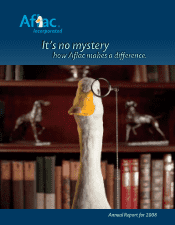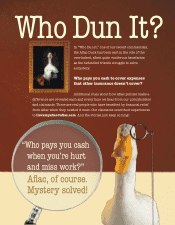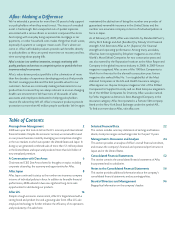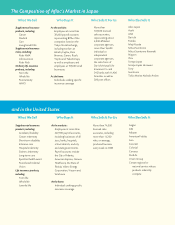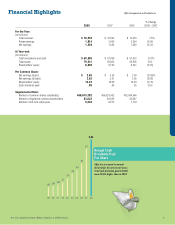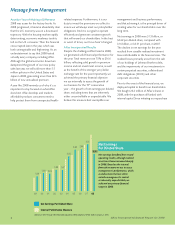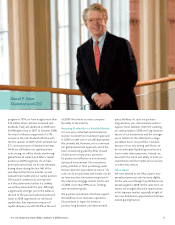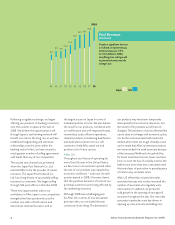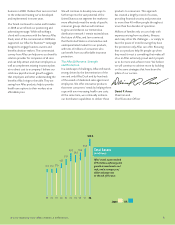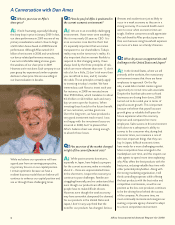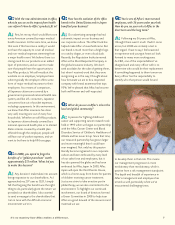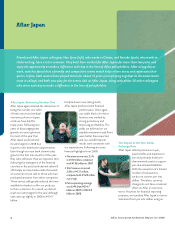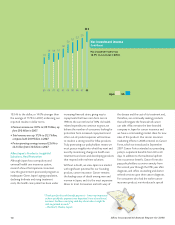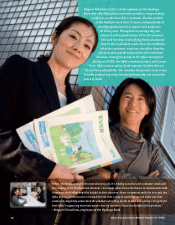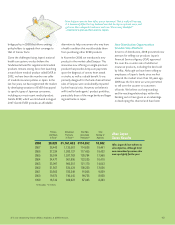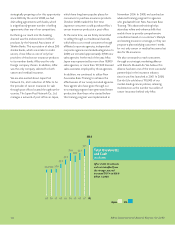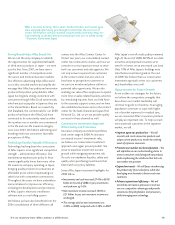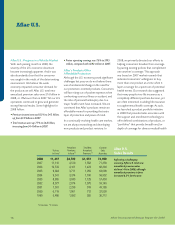Aflac 2008 Annual Report Download - page 10
Download and view the complete annual report
Please find page 10 of the 2008 Aflac annual report below. You can navigate through the pages in the report by either clicking on the pages listed below, or by using the keyword search tool below to find specific information within the annual report.
6Aflac Incorporated Annual Report for 2008
Q: What is your view on Aflac’s
share price?
A: I find it frustrating, especially following
the sharp drop in price in January 2009. In fact,
our share performance in 2009 was one of my
primary considerations when I chose to forgo
a $2.8 million bonus based on 2008 financial
performance. Although Aflac earned $1.3
billion of net income in 2008, and we achieved
our bonus-related performance measures,
I was not comfortable taking a bonus, given
the weakness of our share price in 2009.
However, we’re not alone. Each company in our
peer group has experienced similar or greater
declines in share price. We are now selling at
our lowest valuation in decades.
While we believe our operations will have
a good year from an earnings perspective,
my primary focus is on our capital position.
I remain optimistic because we have a
resilient business model that we believe will
continue to enhance our capital position and
see us through these challenging times.
Q: How do you feel Aflac is positioned in
the current economic environment?
A: We are in an incredibly challenging
environment. I have never seen anything
like it in my nearly 20 years as CEO. It is
in an economic crisis like this that I feel
it’s especially important that we remain
transparent to our shareholders. Today’s
reality may not be tomorrow’s reality. It’s
also important that we remain flexible to
respond to that changing reality. I have
always lived by the three principles of risk,
which are more relevant than ever: 1) don’t
risk a lot for a little, 2) don’t risk more than
you can afford to lose, and 3) consider
the odds. Those principles certainly apply
to investing in today’s market. We have
tremendous cash flows to invest each year.
For instance, in 2008 we invested more
than ¥590 billion, which translates to about
¥2.4 billion or $23 million each and every
day we were open for business. When
investing these funds for the future benefit
of our customers, we take great care.
Over the long term, we have produced a
very good investment track record. I was
not happy with the investment losses we
incurred in 2008, but I’m pleased that
Aflac’s balance sheet was strong enough
to absorb those losses.
Q: Has your view of the market changed
in light of the current financial crisis?
A: While past economic downturns,
especially in Japan, have helped us prepare
for the current economy, make no mistake
about it – these are unprecedented times.
In the short term, I expect the economy to
continue to pose challenges. Families are
struggling financially, and we understand that
even though our products are affordable,
people have to make difficult choices.
However, even though the weak economy
may have somewhat dampened the demand
for our products in the United States and
Japan, I don’t in any way think that the
need for our products has changed. Serious
illnesses and accidents are just as likely to
occur in a weak economy as they are in a
strong economy. If a covered health event
were to occur when economic times are
tough, I believe consumers would appreciate
the cash benefits Aflac products pay more
than ever because rising household expenses
are more of a drain on a family’s finances.
Q: What do you see as opportunities and
challenges in the United States and Japan?
A: In the United States, where we sell
primarily at the worksite, the recessionary
environment means that there are fewer
employees to approach. On the flip
side, a weak labor market creates a great
opportunity to recruit new sales associates.
Despite the fact that sales were soft and
businesses are closing their doors, 2008
turned out to be a solid year in terms of
payroll account growth. This is important
because we believe that payroll account
growth gives us valuable shelf space for
future expansion when the economy
improves and companies hire more
employees. Sales success in this environment
boils down to a salesperson’s ability to
convey to the consumer why, during bad
economic times, our insurance is one of
the most important things that they can
buy. In Japan, difficult economic times
have made for a more challenging market.
More competitors have emerged in the
marketplace over time, and this requires our
sales agents to spend more time explaining
why Aflac offers the best products with the
best price, reducing valuable face time with
other potential policyholders. Along with
the strong marketing organization, I still
think controlling expenses while offering
the best products with the best value and
competitive commissions, as well as our
position as the low-cost producer, continues
to be the driving force behind the success
of the company. At the same time, we
must continually motivate and energize our
existing corporate agency channel to adapt
to a more competitive environment.
A Conversation with Dan Amos

